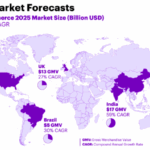The European Union (EU) is considering actions to address the rapid rise of Chinese fast fashion retailers, such as Shein and Temu, in its market. These companies have seen explosive growth across Europe, sparking concerns among European producers and policymakers. The European Commission is now weighing punitive measures aimed at curbing the dominance of these Chinese merchants, which are viewed as a direct threat to the region’s fashion and textile industries.
Fast Fashion’s Impact on the European Market
Shein and Temu, both well-known for offering trendy, low-cost clothing, have quickly gained popularity among European consumers. Their business model, which focuses on high turnover of products and extremely low prices, has allowed them to compete aggressively in the fast fashion industry. This has resulted in significant pressure on local European retailers, who often struggle to match the prices and speed at which these Chinese companies can introduce new items to the market.
The EU is increasingly concerned that the rise of these companies is harming European producers. Local manufacturers and fashion brands face challenges in competing with the scale, speed, and low-cost offerings of retailers like Shein and Temu, whose products are largely imported directly from China. As a result, some European businesses are finding it difficult to maintain profitability, leading to calls for intervention.
European Commission’s Response
In response to these concerns, the European Commission is exploring possible measures to slow the growth of Chinese fast fashion giants. One potential action is the introduction of punitive measures, such as tariffs or stricter regulations on imports from Chinese merchants. These measures would aim to level the playing field for European producers and retailers, who argue that the current market dynamics are unsustainable.
The Commission sees this as not only an economic issue but also a broader question of fair competition. Chinese companies like Shein and Temu benefit from low production costs and rapid supply chains, giving them an edge over European competitors. There are also concerns about labor practices and environmental standards associated with fast fashion production, which have been areas of growing scrutiny within the EU.
Challenges Ahead
However, implementing these measures may prove challenging. Chinese retailers have built a strong consumer base in Europe, and any action taken to restrict their presence in the market could face pushback from consumers. Shein and Temu’s low prices and wide variety of products have made them popular among shoppers, particularly in younger age groups. Limiting their ability to operate freely in the EU could lead to higher prices and fewer choices for consumers.
There are also legal and trade implications to consider. The EU must ensure that any actions it takes comply with international trade rules. Additionally, any restrictive measures could potentially lead to retaliatory actions from China, further complicating trade relations between the two economic powers.










